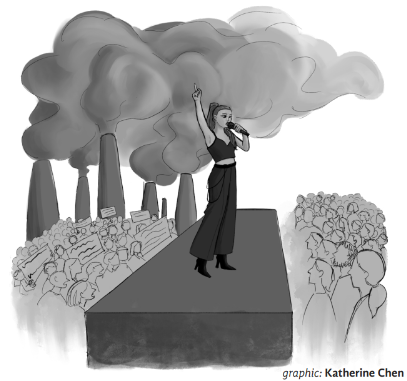Stop relying on celebrity activism
November, 2023
In the past, celebrities were shining stars: singers, dancers and politicians only seen by fans on the black screens of television. Now, in the age of unrestrained usage of social media, the distance between celebrities and fans is stripped. From convincing fans to purchase a product they endorse to imposing their views on important world events and issues, celebrities and public figures now hold the power to influence an impressionable audience with the click of a button.
After the senseless killings of George Floyd and Breonna Taylor in 2020, the Black Lives Matter movement saw a massive influx of attention on various media. From trending Twitter “blacklivesmatter” hashtags to the 28 million Instagram users who participated in “Blackout Tuesday,” publicly proclaiming support on social media for BLM was deemed the right thing to do, and keeping silent was perceived as immoral and almost racist. Brands and celebrities rode on this social media wave, blacking out their social media profile pictures and professing their support to the movement in posts. While these popular gestures were intended to show solidarity with the movement, it set a larger precedent that activism simply meant announcing one’s alignment with a cause without the intention of further support.
Mass distribution of misguided statements is the central cause for the spread of misinformation, an all too common consequence of celebrity “activism.” A study conducted by researchers at Reuters Institution in 2022 found that 20 percent of posts containing misinformation about COVID-19 were created by influencer profiles. Even more damaging, because of their large monopoly on social media, celebrity posts on important issues often overshadow expert opinions and helpful resources posted by lesser known accounts, devaluing the function of professional journalism. The often performative nature of celebrity activism becomes clear upon nuanced situations such as the Israeli-Palestinian war, which saw much less celebrity engagement. Given the extreme nuance of the conflict, there was no longer a clear-cut, “politically-correct” side to side with or to jump on the bandwagon for. Many fans blasted their idols upon observing their “silence,” questioning why they weren’t using their platform to weigh in on the situation. However, celebrities shouldn’t be pressured to “speak up” on political issues that they have no background in when expert opinions hold more importance in informing the public.
The influence celebrities have on impressionable fans regarding social issues often unfolds on an emotional level rather than from factual evidence, resulting in unacceptable behaviors by hot-tempered fans that attack individuals who speak out against the misguided ideologies spread by biased public figures. For example, in April 2020, the actor Woody Harrelson shared his claim regarding the 5G network being the cause of the COVID-19 pandemic to his two million followers on Instagram. The time frame of his claims correlated with at least 20 cell tower polls being burned to the ground in the UK. Telecom employees were also harassed on the streets while attempting to set up 5G fiber optic cables. Kanye West, also known for his anti-vaccination stance, told Forbes that he believed COVID-19 vaccinations would “put chips inside of us” during the pandemic. This proven-false conspiracy theory snowballed and soon became a popular statement spread by anti-vaccine groups. Furthermore, the misinformed statements of celebrities are often regurgitated in popular media in order to generate more clicks, consequently exacerbating the spread of their falsified claims.
As teenagers, the demographic most susceptible to celebrity influence, PHS students should be mindful of avoiding valuing their favorite celebrities' opinions over expert opinions in order to make informed decisions. In a time where rampant false information is spread online, it’s important to realize that the power of reliable research to uncover truths is longstanding and undeniable.